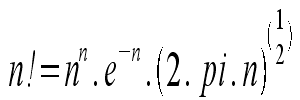Cat 1 can choose any of the 365 boxes. Cat 2 can choose any of the 365 boxes. And so on.
So there are
Ok. You've probably heard of this one, but let's take it from the top.
There are 365 days in the year. So how come, even in a smallish group, there's always a couple of people who share a birthday?
Freaky psychic powers, say some. Similar souls seeking each other out.
Let's look at it this way.
Consider a pile of cats. And three hundred and sixty five boxes. These are big boxes though - each one ould hold many cats.
And cats do like to play in boxes. How many ways can they play?
Cat 1 can choose any of the 365 boxes. Cat 2 can choose any of the 365 boxes. And so on.
So there are ![]() ways to arrange those cats.
ways to arrange those cats.
But some of them - there are multiple cats in a single box. We don't think that's likely. So let's count how many ways we can arrange them WITHOUT overlap. Well, that's easy - from the previous page we know it's 365Cn - 365 boxes and fill up n of them. Obviously if we've more than 365 cats, it's zero. Note that it's nCm and not nPm because we don't care WHO shares a birthday in the group.
So there are ![]() ways of arranging them, and 365Cn 'good' ways, that is ways that do not share a birthday, of arranging them.
ways of arranging them, and 365Cn 'good' ways, that is ways that do not share a birthday, of arranging them.
So what are the chances of getting a 'good' arrangement? =365^n_365Cn.gif)
At this point you either get a calculator with a reallllly wide screen, or cheat a bit. You can do some cancellations, or use Stirlings approximation. (Which says that  )
)
And an interesting thing happens when you graph it:
![[Graph that rapidly approaches 1]](Image68.gif)
Around about 23-25 it becomes more likely that you DO have more than one kitten in a box (or person sharing a birthday) than you don't.